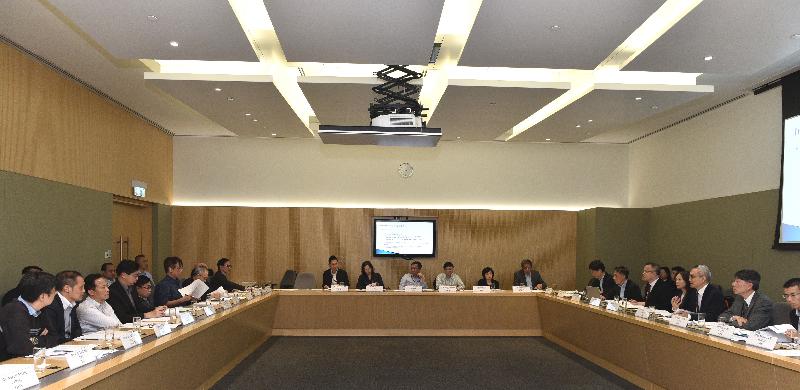The Action Committee Against Narcotics (ACAN) reviewed the local drug situation in 2018, as well as the findings of the 2017/18 Survey of Drug Use among Students (2017/18 Student Survey), at its quarterly meeting today (March 26). While the total number of reported drug abusers continued to decline, the problems of signs of increased youth drug abuse (particularly of cannabis and cocaine), drug abuse among young adults and hidden drug abuse still require attention.
According to the latest figures of the Central Registry of Drug Abuse (CRDA), the total number of reported drug abusers in 2018 decreased by 4 per cent (from 6 875 to 6 611) as compared with 2017. However, the number of reported drug abusers aged under 21 increased by 1 per cent (from 468 to 471). About 60 per cent of drug abusers took drugs at their own homes or their friends’ homes only.
The number of newly reported drug abusers increased by 2 per cent (from 1 622 to 1 662). About half were young adults aged between 21 and 35. The median history of drug abuse of newly reported abusers (i.e. the time for abusers to be reported to the CRDA by reporting agencies from their first drug abuse) was 4.7 years, compared with 4.6 years in 2017.
The total number of reported psychotropic substance abusers continued to be higher than that of narcotic analgesic abusers. Both figures decreased as compared to 2017, by 5 per cent (from 4 080 to 3 894) and 3 per cent (from 3 725 to 3 598) respectively.
Heroin remained the most common type of drug abused, with the number of reported abusers having decreased by 3 per cent (from 3 722 to 3 597). Methamphetamine (commonly known as “Ice”) continued to be the most common type of psychotropic substance abused, but the number of reported abusers decreased by 15 per cent (from 1 784 to 1 518). Cocaine and triazolam/midazolam/zopiclone came next, with the numbers of reported abusers having increased by 10 per cent (from 871 to 962) and 2 per cent (from 883 to 904) respectively. Meanwhile, the number of reported cannabis abusers increased by 17 per cent (from 402 to 472).
For young people aged under 21, increased abuse of cocaine and cannabis was also observed (the number of cocaine abusers increased from 233 to 258 while the number of cannabis abusers increased from 129 to 153).
Other psychotropic substances with reduced numbers of reported abusers included ketamine (from 627 to 485), cough medicine (from 272 to 258) and nimetazepam (from 30 to 24).
ACAN also reviewed the findings of the 2017/18 Student Survey at the meeting today. The Survey is a triennial research project conducted by a research institute commissioned by the Narcotics Division (ND) of the Security Bureau, aiming to obtain information on the latest drug-taking trends of local students, hence facilitating understanding of students’ knowledge of drugs and attitudes towards drug taking. Such information assists the Government in formulating anti-drug initiatives for better responding to the actual situation. The 2017/18 Student Survey successfully surveyed about 120 700 students from upper primary to post-secondary levels, accounting for about 17 per cent of the student population in Hong Kong.
The survey results indicated that the number of students who claimed to have taken drugs had increased by 23 per cent (from 14 500 to 17 800) as compared to the 2014/15 Student Survey. Cough medicine was the most common type of drug taken by upper primary students, and cannabis was the most common type of drug taken by students at the secondary and post-secondary levels. The most common venues for taking drugs were the students’ own homes or their friends’/schoolmates’/neighbours’ homes. Over 80 per cent of drug-taking students indicated that they had never sought help from others as they mostly did not consider themselves addicted.
The ACAN Chairman, Dr Ben Cheung, said, “Although the total number of reported drug abusers in 2018 continued to decrease, the problems of increased youth drug abuse, drug abuse among young adults and hidden drug abuse will need sustained responding measures. ACAN in co-ordination with ND and anti-drug stakeholders will strengthen preventive education for schools, parents, young people, different trades and professions, members of local communities and the public, with the focus to enhance understanding of drug harms, reinforce resolve in resisting drug temptations, facilitate early identification of persons troubled by drugs, and encourage early help seeking.”
The Commissioner for Narcotics, Ms Manda Chan, said, “With some overseas countries and regions having legalised recreational cannabis, young people in Hong Kong may adopt a relatively relaxed attitude to this drug. Leveraging on existing platforms and exploring new channels, we are stepping up publicity to provide correct information on the harms of cannabis abuse, rectify mistaken concepts and help young people to refrain from trying this drug under the misconception that it is not harmful.”
She added, “The Government will continue to adopt the five-pronged anti-drug strategy, namely preventive education and publicity, treatment and rehabilitation, legislation and law enforcement, external co-operation and research, to address the drug situation in concerted efforts with stakeholders.”
The CRDA figures for 2018 and the full report of the 2017/18 Student Survey are available on the ND’s website (www.nd.gov.hk/en/index.htm). read more



